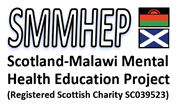Title: Malawi Quick Guide to Mental Health
Authors: Scotland-Malawi Mental Health Education Project (SMMHEP), Government of Malawi, Ministry of Health, University of Malawi (College of Medicine, Kamuzu College of Nursing, Chancellor College), St John of God Hospitaller Health Services, Malawi, Mental Health Users and Carers Association (MeHUCA)
Type of resource: PDF report
Length: 93 pages
Date: May 2020
About:
“Who is it for? The Malawi Quick Guide to Mental Health was produced to provide practical information for the assessment and management of mental disorders in Malawi. The Guide is for the busy primary care healthcare provider working at first- and second-level healthcare facilities in Malawi. Brought together in May 2020 during the global COVID-19 pandemic, it particularly aims to support non-specialist healthcare workers who find themselves caring for people with mental disorders for the first time. In Malawi, there are three Consultant Psychiatrists for a population of approximately 20 million people. It is clear that we cannot rely solely on specialists to provide mental health care.
What does it contain? The Malawi Quick Guide to Mental Health opens with advice for managing mental health during a time of crisis, such as the current global COVID-19 pandemic (Part 1). There is detail on how to perform mental health first aid and quick reference sheets for managing Mental Health Emergencies (Part 2). Principles of Assessment and Management (Part 3) provides an overview of good clinical practice and describes how to perform a mental health assessment. The guide prioritises disorders based on their level of burden in terms of mortality, morbidity and disability. These priority disorders include delirium, depression, anxiety disorders, psychoses, self-harm/suicide, drug and alcohol use disorders, epilepsy, and dementia. In Assessment and Management of Psychiatric Disorders and Epilepsy (Part 4) the guide focuses on management approaches identified based both on evidence about their effectiveness and their feasibility in Malawi. Important considerations in the assessment and care are described for Special Patient Groups (Part 5) including older adults, mothers, and children. There are Information Leaflets for Patients and Carers (Part 6) in English and Chichewa that have been in part adapted with permission from material available on the websites of the Royal College of Psychiatrists, Mind and the National Centre for Mental Health. These leaflets can be photocopied and handed to patients and their carers as appropriate. Other Resources (Part 7) includes advice on how to ask assessment questions in Chichewa and a temporary treatment order for photocopying.
What it is not: This quick guide is not a comprehensive textbook and there will be many cases that cannot be managed by following the guidance contained in it. Recognising your limits and those of your service is important for the safety of patients. There is information on when to refer to specialists in the section titled Key Principles of Managing Mental Health in Part 3.”

